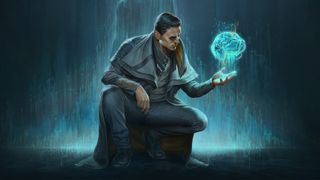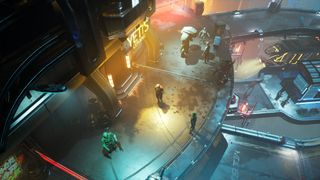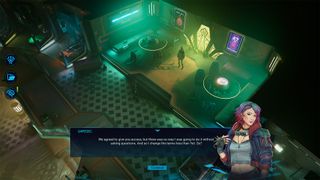This new cyberpunk RPG lets you solve crimes in virtual worlds
Become a VR sleuth in Gamedec.

This tabletop-inspired isometric RPG has a neat premise. You're a private detective hired to solve cases in virtual worlds. A game detective, if you will. You know, a... gamedec? Yeah, it's a terrible name, but the concept of diving into simulated worlds and solving crimes is a strong one. Set in Warsaw in the 22nd Century, VR has become so convincing that people rarely spend time in the increasingly grim, dystopian real world. And who can blame them? In this dark cyberpunk future, life sucks, which has contributed to the sheer popularity of VR.
But the problem with spending all day hanging out in virtual worlds where there are no real consequences is that it tends to bring out the worst in humanity. I mean, play any popular online game today for more than ten minutes and this isn't hard to imagine. And as a result, crime has become an issue in these VR worlds, to the point where cybercops like you have to be brought in. You create your own detective, using abilities and professions to determine what kind of sleuth you'll be, although I've yet to get a sense of how deep this actually is.

According to the lore, gamedecs are also experts at the VR games they investigate, which means they're kinda like a crossover between an esports pro and a private detective. Some of the crimes you investigate happen on the very real, very rain-soaked streets of Warsaw, but you'll also be able to venture into virtual worlds too. These include a seedy 21st Century city where people role-play, GTA-style, as criminals, or a romanticised feudal Japan where players can pretend to be ninja and samurai. It's kinda like Westworld minus the robots.
I played a demo of Gamedec, set in a tiny, closed off crime scene somewhere in the depths of Neo Warsaw. It presents only a miniscule fraction of what the final game will offer, with a lot of dialogue options, decisions, and menus locked off. But I did get a bit of a taste of the game's detective systems. A man with a pair of holographic bat wings is lying dead on the rain-slicked pavement, seemingly shot out of the sky by an automated drone the city uses to kill vermin. But come on, I've read enough detective stories to know that something else is up.
Refreshingly, there's no combat—although you can still die, albeit temporarily until whichever VR world you're in respawns you. This is a game about conversations, investigation, and piecing together clues to paint a picture of the truth. I get a sense of this as I explore the crime scene, interrogating witnesses, hacking CCTV cameras and drones, and using my detective skills—in the form of RPG dice rolls—to root out hidden clues. These clues are then added to a codex that you can access, linking them together to make deductions.

I don't know if Anshar Studios, Gamedec's developer, is a fan of Sherlock Holmes: Crimes & Punishments, but the deduction system is very similar. You're given several conclusions, and must create a path towards the correct one (or what you think is the correct one) by linking clues to it. Sherlock was great because you could easily draw faulty conclusions and pin the crime on the wrong person, and I wonder if we'll see something similar here. The developer says the game "never judges" your choices, which makes me think it might.
As I explore the crime scene I learn a few things that add weight to the theory that the victim was shot down by one of those anti-vermin drones. Apparently giant fruit bats are a problem here, and it seems the drone may have mistaken the dead man for one as he fell from above with those wings on. But why was he falling through the air in the first place? And why was he wearing holographic wings? The best detective stories throw up a lot of intriguing questions, and Gamedec does a decent job of making me want to find answers to them.
The biggest gaming news, reviews and hardware deals
Keep up to date with the most important stories and the best deals, as picked by the PC Gamer team.
This involves quizzing people, including a robot, loitering around the crime scene. And, of course, a lot of hacking—which in this demo involves little more than standing and watching a meter fill. I'm not the biggest fan of hacking minigames, but I'd like a little more to do than just stand there. A cop I meet doesn't seem to be a fan of gamedecs, so I have to appeal to his ego by telling him how great he is to get access to the drone. These conversation options are determined by your stats, although I didn't get a chance to experiment with this.

As a fan of detective games, in theory I should be pretty excited about Gamedec. But I'm not there yet. The investigation mechanics are sound, but the writing is not great—especially after being spoiled by Disco Elysium. It feels flat and amateurish, and the future slang (gamedec being a prime example) comes across very forced—in the same way everyone calling you 'choom' in Cyberpunk 2077 does. A non-combat RPG relies on quality writing, but Gamedec's script isn't working for me yet. I hope the finished game does a better job.
I want Gamedec to succeed, because Disco Elysium proved that you don't need turn-based battles to make a compelling RPG. Gamedec seems to be carrying that torch—or at least attempting to—by letting you talk your way out of problems. Of course, for any detective game, it all really boils down to the quality of the cases. If Anshar can create compelling mysteries with satisfying solutions, it might just make up for the game's other shortcomings. I guess we'll find out when the game is released on September 16.
If it’s set in space, Andy will probably write about it. He loves sci-fi, adventure games, taking screenshots, Twin Peaks, weird sims, Alien: Isolation, and anything with a good story.
Most Popular

